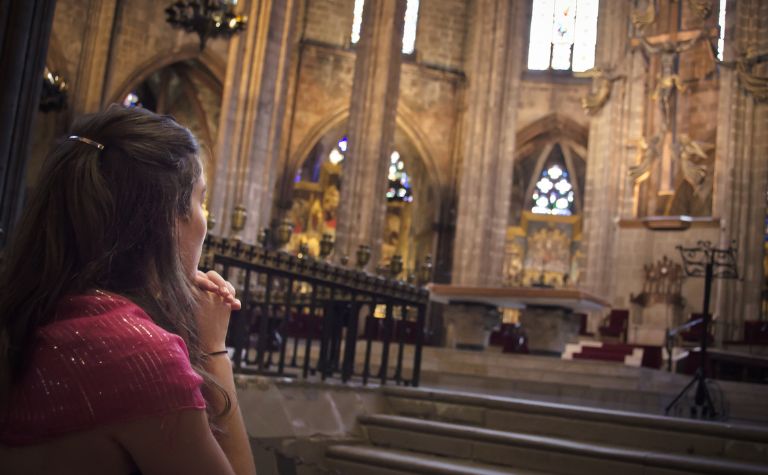Episcopalians, as part of the worldwide Anglican Communion, hold several beliefs that distinguish their tradition within Christianity. These distinctive beliefs shape their understanding of faith, worship, and the practice of Christianity.
Episcopalians uphold Scripture, tradition, and reason as pillars of their theology. They recognize baptism and communion. They value apostolic succession, tracing bishops back to Christ’s apostles. And their “Middle Way” approach reflects a balance amid different Christian traditions.
How does the three-pillar view compare with Sola Scriptura? How does the Episcopalian view of the sacraments compare to Catholicism’s? How does baptism and communion compare with the Catholic and Baptist view? What is the Middle Way, and why is it unique? Keep reading to learn the answers to these questions and others.
Also, compare Episcopalianism with other churches on the Christian Denominations Comparison Chart.

The Three Pillars: Scripture, Tradition, and Reason
The “three-legged stool” of Scripture, tradition, and reason is foundational to Episcopalian theology. They believe the Bible is the word of God and the primary source of faith, but it should be interpreted in light of church tradition and human reason. This balance allows for a wide range of theological perspectives within the church.
| Episcopal View of Scripture | Sola Scriptura View of Scripture | |
|---|---|---|
| Source of Authority | The “three-legged stool” of Scripture, Tradition, and Reason. Scripture is a primary source of authority but is interpreted in the light of tradition and human reason. | Scripture alone is the ultimate authority for Christian faith and practice. Other sources, like church tradition, are seen as subordinate to or evaluated by the Bible. |
| Interpretation | Scripture is interpreted within the community, guided by tradition and reason. Different interpretations can coexist, allowing for a diversity of theological perspectives. | Scripture is seen as clear in its central messages and can be interpreted by individuals guided by the Holy Spirit. |
| Role of Church Tradition | Church tradition is viewed as a critical component in understanding Scripture and informing theology. | Church tradition may be respected, but it is tested by and subject to Scripture. |
The Episcopalian View of the Sacraments
Episcopalians recognize two primary sacraments, Baptism and the Eucharist (Holy Communion), just like the Roman Catholic and Eastern Orthodox churches.
However, they also recognize other spiritual milestones such as confirmation, ordination, marriage, reconciliation of a penitent, and unction (anointing of the sick) as sacramental rites.
| Episcopal View of Sacraments | Roman Catholic View of Sacraments | |
|---|---|---|
| Number of Sacraments | Two primary sacraments: Baptism and the Eucharist. Five other rites (Confirmation, Ordination, Marriage, Reconciliation, and Unction) are recognized as sacramental. | Seven sacraments: Baptism, Confirmation, Eucharist, Penance (Confession), Anointing of the Sick, Holy Orders, and Matrimony. |
| Baptism | Baptism is viewed as a rite of initiation into the Christian community. Infants can be baptized, but a personal affirmation of faith is expected later in life. | Baptism, often performed in infancy, removes original sin and initiates the individual into the Church. |
| Eucharist | Christ is spiritually present in the Eucharist. The precise nature of this presence is a mystery, not defined in a particular way. | The bread and wine become the literal Body and Blood of Christ (transubstantiation) but continue to appear as bread and wine. |
| Confession | Private confession is available but not required. A general confession and absolution are part of the Eucharist service. | Private confession of sins to a priest is obligatory at least once a year. The priest grants absolution. |
| Marriage | Marriage is a sacramental rite, open to both opposite-sex and same-sex couples. Divorced persons can remarry in the church. | Marriage is a sacrament, only recognized between a man and a woman. Remarriage without an annulment is not permitted. |
Also, see Episcopalianism vs Baptist: What’s the Difference? to learn more.

| Episcopalian View | Baptist View | |
|---|---|---|
| Baptism | Baptism is a sacrament of initiation into the Christian community. It can be performed at any age, including infancy. Water is sprinkled on the person’s head in the name of the Father, Son, and Holy Spirit. | Baptism is seen as an outward testimony of an individual’s inward faith, typically reserved for believers who can profess their faith. It is performed by full immersion in water. |
| Meaning of Baptism | Baptism represents being cleansed from sin and beginning a new life in Christ. It is seen as a means of grace and marks the start of the Christian journey. | Baptism symbolizes the believer’s identification with Christ’s death, burial, and resurrection. It does not confer grace but is an act of obedience following faith in Christ. |
| Communion (Eucharist) | The Eucharist is a sacrament where Christ is believed to be spiritually present. All baptized Christians are invited to partake, regardless of age or denomination. | Communion, also known as the Lord’s Supper, is a memorial to Christ’s death. It involves consuming bread and wine (or grape juice), typically open to all believers who are in good standing with their local church. |
| Meaning of Communion | In the Eucharist, participants partake of the body and blood of Christ (in the form of bread and wine), sharing in his life, death, and resurrection. The exact nature of Christ’s presence is seen as a mystery. | Communion is a remembrance of Christ’s sacrifice. The bread and wine symbolize the body and blood of Christ but are not considered to become these elements. |
Apostolic Succession in Episcopalian Theology
In the Episcopalian tradition, the doctrine of apostolic succession is important. Here are five key characteristics:
Historical Continuity: Apostolic succession provides a tangible link from the present-day church to the apostles and ultimately to Christ Himself. This sense of historical continuity is crucial to the Episcopal understanding of the church.
Sacramental Integrity: Episcopalians believe that apostolic succession maintains the authenticity and integrity of the sacraments. Only bishops in the line of apostolic succession can ordain priests and deacons, ensuring the legitimacy of the sacraments they administer.
Authority and Leadership: Apostolic succession underlines the authority of bishops. As successors to the apostles, bishops are seen as shepherds of the church, upholding the faith and guiding the community.
Unity of the Church: The doctrine contributes to the unity of the church. It creates a visible, worldwide communion of churches that share the apostolic foundation as part of the Anglican Communion.
Tradition and Innovation: While maintaining tradition, the Episcopal Church also allows for adaptation to changing times. Even within apostolic succession, there’s room for diversity of thought and interpretation, reflecting the Episcopal balance of tradition and reason.
Also, see Episcopalianism vs Evangelicalism: What’s the Difference? to learn more.

Middle Way Approach
The Anglican tradition, including the Episcopal Church, often describes itself as a “via media” or “middle way” between Protestantism and Roman Catholicism.
This perspective is reflected in the Episcopalian balance between the Catholic emphasis on sacraments and church tradition and the Protestant focus on the Bible and individual faith. This “middle way” approach can be seen in their liturgy, church structure, and theological perspectives.
| Middle Way | Single Path | |
|---|---|---|
| View on Scripture | Episcopalians emphasize the balance of Scripture, Tradition, and Reason. While Scripture is seen as the word of God, its interpretation involves both tradition and reason. | Some traditions may place exclusive emphasis on Scripture (Sola Scriptura) or give overwhelming authority to Church Tradition, allowing little room for individual reason or interpretation. |
| Sacraments | Recognize two primary sacraments (Baptism and Eucharist) and five sacramental rites. This allows for a spectrum of sacramental theology between Roman Catholic and Protestant views. | Some traditions recognize either more sacraments (like the seven in Roman Catholicism) or fewer (like the two or none in many Protestant traditions). |
| Church Governance | Episcopalian governance involves bishops in apostolic succession but also includes democratic elements with laity involvement. | Other traditions may emphasize strictly hierarchical structures (such as Roman Catholicism) or lean towards congregational governance with little hierarchical authority (as in many Baptist churches). |
| Theology | Episcopalian theology allows for a wide range of beliefs within the overarching framework of the Anglican tradition. It balances between liberal and conservative views. | More polarized approaches may lean heavily towards liberal or conservative interpretations of Christian belief, allowing less theological diversity. |
| Social Issues | The Episcopal Church often navigates a middle path on social issues, affirming both traditional and contemporary understandings. | Some churches may take more conservative stances based on strict interpretations of Scripture or tradition, while others may adopt more liberal positions based on contemporary societal values. |
Also, see the 100 Largest Denominations in America to learn more.
Related Questions
Episcopalian vs. Non-Denominational Christianity: What's the Difference?
Many people know that "Episcopalian" and "non-denominational" describe different kinds of Christian churches. They know the traditions have some overlapping beliefs and similar practices because they...
The Episcopalian tradition and Roman Catholicism are historical branches of the Christian faith that have important similarities and differences. Comparing the churches provides people with insight...
